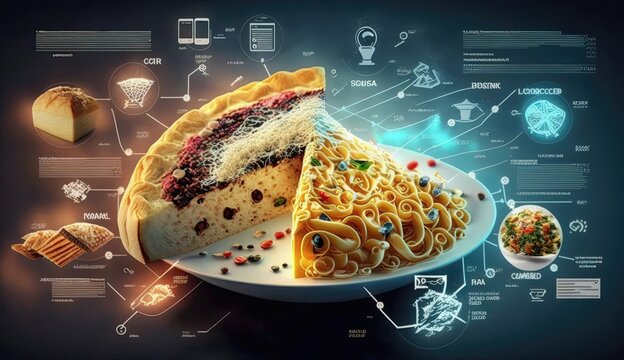An Eatery Revolution How Food Technology Will Affect What We Eat in the Future. It is the source of consolation, the energy that keeps us going, and the foundation of cultures everywhere. However, food technology innovation is driving a profound revolution in how we cultivate, process, and consume food. This piece explores the fascinating field of food technology and how it’s affecting our kitchens, agriculture, and eventually the future of our food system.
Precision Agriculture
Streamlining the Farm for a Sustainable Future
Three major obstacles confront traditional agriculture: climate change, resource shortage, and feeding a growing population. Precision agriculture, a data-driven strategy that optimizes crop yields and resource utilization using sensors, robots, and automation, is one way that food tech provides solutions.
Imagine drones tracking fields to get data on plant health, nutritional levels, and soil moisture in real time. AI systems that prescribe targeted fertilization, irrigation, and pest control are subsequently fed this data. In addition to increasing yields, precision agriculture decreases pesticide use, conserves water, and supports ecologically friendly agricultural methods.
Farming with Cells
Meat Without the Feeling?
Although there is a large demand for meat, conventional meat production adds to greenhouse gas emissions and poses ethical questions. Cellular agriculture can help in this situation. With the use of this cutting-edge technology, it will be unnecessary to raise animals because meat can be grown straight from animal cells.
Researchers take muscle stem cells from animals and grow them in a lab setting with the nutrients they need to proliferate and develop into muscular tissue. Real meat is what’s left over; it has the same texture, flavor, and nutritional makeup as meat from conventional farms, but it leaves less of an environmental impact. Cellular agriculture has great promise for a more ethical and ecological meat business, even though it is still in its infancy.
The Emergence of Plant-Based Alternative Proteins: They’re Taking Center Stage
There is no longer a niche market for plant-based proteins. Food tech businesses are meeting consumer demand for meat substitutes that are sustainable and healthful. Innovative ingredients that replicate the taste and feel of meat are being used to create delicious and fulfilling plant-based burgers, sausages, and even steaks. These ingredients include mycoprotein, which is derived from fungi, and isolates of pea and soy protein.
Food technology is creating innovative plant-based products, such as dairy substitutes developed in labs, in addition to animal substitutes. Dairy cells are cultured in a bioreactor to produce milk, cheese, and yogurt, all without the need for cows. This lessens the environmental effect of dairy production in addition to meeting dietary needs and lactose intolerance.
Food Processing in the Future:
Minimally Processed, Maximum Nutritious
Food processing has a negative reputation since it’s frequently connected to unhealthful chemicals and preservatives. But food technology is transforming processing techniques to provide minimally processed, safe, and nutrient-dense goods. Among these is High-Pressure Processing (HPP). Strong pressure is used in this non-thermal method to get rid of microorganisms without affecting the food’s original flavor, texture, or nutritional value.
Pulsed electric field (PEF) processing is another invention; it employs brief electrical bursts to render germs inactive. These techniques maintain the quality of fresh vegetables while extending shelf life.
The Smart Kitchen: Meal Preparation Meets Technology
The kitchen is becoming into a center for innovation rather than just a location to prepare food. The way we cook is evolving due to the presence of sensors and connectivity in smart equipment. Imagine a refrigerator that knows what expires on its own and can automatically make grocery lists or dish suggestions depending on your dietary requirements.
While voice assistants that are connected can walk you through recipes step-by-step, smart ovens can alter cooking times and temperatures to provide flawless results every time. Cooking is now more accessible, effective, and convenient for everyone thanks to food technology.
Customized Diet
Meals Made Just for You
Personalized nutrition is becoming possible thanks to food technology. Envision undergoing a DNA test that discloses your body’s specific dietary requirements. AI-powered systems can provide personalized meal plans and food products that are specifically designed to improve your health and well-being based on this information.
This degree of customization extends beyond dietary components. For anyone with dietary needs or health issues, 3D food printing offers the ability to produce meals with precise textures, flavors, and even medicine dosages.
The Ethical Aspects
Sustainability and Transparency
Even while food technology is exciting, ethical issues must be taken into account. Openness at every stage of the food chain is crucial. Customers have a right to know where their food comes from, what ingredients are in it, and how it was made.
Moreover, sustainability needs to continue to be a fundamental idea. Environmental impact and resource efficiency must be the primary considerations in the development and implementation of food tech solutions. A sustainable food tech future depends on ethical labor standards, avoiding waste during the production process, and obtaining ingredients responsibly.
The Future of Food:
An Integrated Strategy
In the future of food, teamwork will be equally as important as technology.








Leave feedback about this